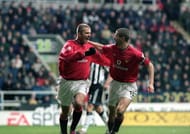Writing your memoirs is tricky business. Few of us live lives interesting enough to fill a decent-sized book with anecdotes that can amuse, titillate or shock the reader. It gets particularly hard when you have a reputation to maintain: do you go with the flow or skip some of the more jarring bits?
In a week that has several high-voltage Champions League clashes and a Clasico, Sir Alex Ferguson stole the limelight with a book launch. The book is partly an exercise in score-settling, which is interesting in that Ferguson – a well-known stickler for club secrecy – has dynamited some of his former players.
In particular Roy Keane, Ferguson’s longtime captain from the early 90s, was the target of a hefty broadside. “The hardest part of Roy’s body is his tongue,” writes Ferguson. He goes on to describe Keane as “intimidating and ferocious” and derides his negative influence on the dressing room.
Not one to be outdone, Keane hit back promptly. “I remember having conversations about loyalty when I was at the club,” he said. “I don’t think he knows the meaning of the word. To constantly criticise other players that brought him success… I won’t be losing any sleep over it.”
Ferguson does add that they patched up later in 2005 and agreed never to talk about the incident in public. He believes that Keane broke the agreement in a 2011 interview where he criticized Ferguson over the Rock of Gibraltar affair. But he has lit the flames of a controversy that is unlikely to go away any time soon.
It is damaging to United. The nascent era of David Moyes needed stability and a show of unity to thrive, not the unseemly sight of his predecessor – whose shadow still looms large – getting into a public spat with other club icons. Despite his foul mouth and the dislike he generates, Keane was vital in United’s meteoric rise.
A generation of successful players grew under his captaincy. No matter how bitter his fallout with Ferguson was, this was not the time for his former manager to attack him – if ever.
Perhaps Ferguson thought he could diminish the furore by waiting till after his departure from Old Trafford, but he unwittingly damages his own persona as well.
In his heyday Ferguson was sometimes compared to a Mafia don in jest, so the stream of inside truths – including milder criticisms of David Beckham and Wayne Rooney – might be perceived as breaking the Omerta he himself had installed at United – don’t ever talk about the club. United players never discuss their teammates in public – or even in private, as David James found out a few years ago.
Ferguson does that, and more. To be fair, he singles out non-United personalities for attack too: Rafael Benitez was ‘silly’ to have made it ‘a personal thing’ in 2009 with his infamous ‘facts’ speech. ‘Liverpool need another 8 players to win the league,’ he adds.
Elsewhere he unfortunately doesn’t devote much time to Jose Mourinho, the only man Ferguson publicly recognized as his match. Arsene Wenger receives friendly, even affectionate treatment; Paul Scholes gets a veritable love letter.
It is however largely his own players that bear the brunt of his famous hairdryer. In doing so he has divided United fans – some calling him brutally honest, others pointing out that the tone and targets were totally unnecessary.
United would not have had a Treble in 1999 had Keane not put on a spectacular one-man show to win them the Champions League semi-final against Juventus. In the final, Beckham took the corners from which United scored. Ferguson was knighted at the end of the year.
In assailing both players, Ferguson comes across as petty. His judgment – perhaps his greatest weapon as a manager – has let him down here. A judgment that was spot on nine times out of ten.
Remember this is the man who signed Robin van Persie when conventional wisdom told him to look for a central midfielder; he sold Beckham, to general disbelief; he persisted with a 4-4-2 for fifteen years, when the rest of Europe had moved far beyond it – and he still won, through instinct, street wisdom and a bit of luck.
This in turn built a veneer of invincibility. And that automatically extended to the organization he ran.
But aura, charisma and those other intangibles of personality are fickle. To build one takes time; to dent it takes one act of indiscretion.
This book is badly-timed and tarnishes his own legacy while casting a long, unforgiving shadow over Moyes as he struggles to create his own. It is hardly a smart move from a man who had stayed up by being watchful and second-guessing his opponents at every stage.
Let there be no two opinions about it: Ferguson plus Manchester United was greater than the sum of its parts and the separation, though inevitable at some point, has left both entities looking vulnerable.
Ferguson has chosen to further weaken both by hanging out the dirty linen in public. His achievements are permanent but, like a fallen Khal, the aura has developed a perceptible dent. And that is irrevocable.

